Zoom
Trash

Passwords on the dark web after the T-mobile breach? How to check what was le... Was your information stolen as part of the T-Mobile hack this month?
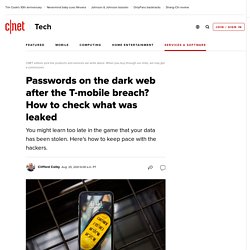
According to T-Mobile, the attack exposed personal data of more than 13.1 million current customers and 40 million former or prospective customers, including names, dates of birth and Social Security numbers. That makes more than 50 million customers of T-Mobile and its prepaid Metro network who may have had private information exposed. Any stolen personal information that leads data thieves to your identity can let hackers do everything from make purchases and open up credit accounts in your name, to file for your tax refunds and make medical claims, all posing as "you.
" Most Important Phishing Types and Detection Methods - Phishing.org.uk. When hackers pretend to be from a real company and trick users by phone, text message, or e-mail, it is called phishing.
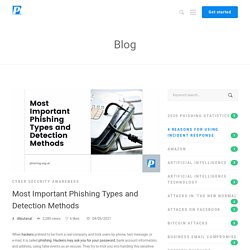
Hackers may ask you for your password, bank account information, and address, using false events as an excuse. They try to trick you into handing this sensitive data over to them. In this piece, we will give you information about the most important phishing types and detection methods to prevent these attacks. For sale: your personal data. Cover Story: Sidebar Posted Jan 01, 2017 04:20 am CST By Terry Carter Cambridge Analytica Some experts credit a little-known voter-data company based in London for President-elect Donald Trump’s election victory, with late-campaign efforts that used as many as 5,000 pieces of data for each American voter to identify millions who could be moved to vote for him.
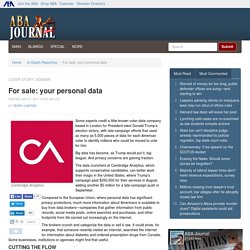
Big data has become, as Trump would put it, big league. Bgr. It might be tempting to assume that your credit card number is the holy grail for hackers, in terms of the value that it can fetch on the dark web.
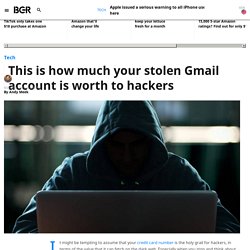
Especially when you stop and think about all of the places that you’ve given your card number to — everywhere you’ve typed it online or physically swiped the card in person — it’s easy to see where it’s the kind of thing that would be somewhat easy for thieves to get their hands on, and something they’d love to have since it ostensibly translates into instant financial gain. Based on a new dark web price index for 2021 that was prepared by the data privacy- and cybersecurity-focused website Privacy Affairs, however, it’s actually your Gmail account that would in many cases reap a much better financial reward for hackers than a stolen credit card number.
Once Stolen, What Do Hackers Do With Your Data? It’s a common question: What happens to your data after a hacker steals it?

Understanding the nuts and bolts of an attacker’s post-hack routine is not only interesting, but it could also help you minimize the damage if your data is stolen. (Note that the following information is a general overview of the most common steps a hacker takes to monetize stolen information. Individual cases may vary and this does not apply to nation-state actors that hack for reasons other than making money.) Once an attack has happened and the criminal has your data, he or she likely runs through the following steps, which we like to call, “A Hacker’s Post Breach Checklist:” How Do Criminals Use Stolen Data? How are criminals using stolen data?
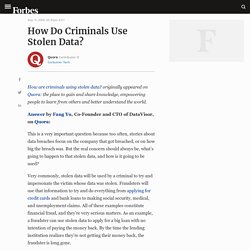
Originally appeared on Quora: the place to gain and share knowledge, empowering people to learn from others and better understand the world. Answer by Fang Yu, Co-Founder and CTO of DataVisor, on Quora: This is a very important question because too often, stories about data breaches focus on the company that got breached, or on how big the breach was. But the real concern should always be, what’s going to happen to that stolen data, and how is it going to be used? The data brokers quietly buying and selling your personal information. Www.theregister.co. Japanese hotel chain HIS Group has apologised for ignoring warnings that its in-room robots were hackable to allow pervs to remotely view video footage from the devices.
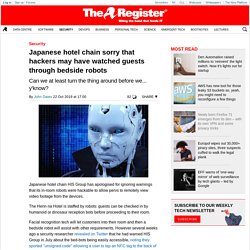
The Henn na Hotel is staffed by robots: guests can be checked in by humanoid or dinosaur reception bots before proceeding to their room. Facial recognition tech will let customers into their room and then a bedside robot will assist with other requirements. However several weeks ago a security researcher revealed on Twitter that he had warned HIS Group in July about the bed-bots being easily accessible, noting they sported "unsigned code" allowing a user to tap an NFC tag to the back of robot's head and allow access via the streaming app of their choice.
Having heard nothing, the researcher made the hack public on 13 October. The vulnerability allows guests to gain access to cameras and microphones in the robot remotely so they could watch and listen to anyone in the room in the future. The Value of Data - Dr Tom Fisher, Privacy International. Personal Data: the new oil and its toxic legacy under the General Data Protection Regulation.
Data Protection is not the only answer, in an era where connected devices, sensors and invisible cameras are increasingly in our homes, on our bodies, at our work places and in public spaces.
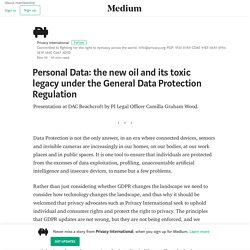
It is one tool to ensure that individuals are protected from the excesses of data exploitation, profiling, unaccountable artificial intelligence and insecure devices, to name but a few problems. Rather than just considering whether GDPR changes the landscape we need to consider how technology changes the landscape, and thus why it should be welcomed that privacy advocates such as Privacy International seek to uphold individual and consumer rights and protect the right to privacy. The principles that GDPR updates are not wrong, but they are not being enforced, and we continue to see huge data breaches. GDPR is evolution, not revolution. Data Brokers and the value of data. Data as a commodity. Inside the toxic world of online fraudsters. 10 June 2014Last updated at 21:14 ET By Samantha Poling Investigations correspondent, BBC Scotland Kaspersky Lab tries to identify criminal gangs online We Britons spend £500m a week on the internet but just how safe is our money and what is being done to protect us from the global rise of cybercrime?
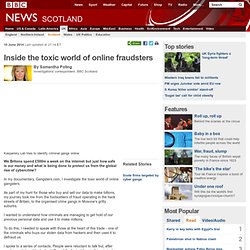
In my documentary, Gangsters.com, I investigate the toxic world of online gangsters. As part of my hunt for those who buy and sell our data to make billions, my journey took me from the footsoldiers of fraud operating in the back streets of Britain, to the organised crime gangs in Moscow's gritty suburbs.